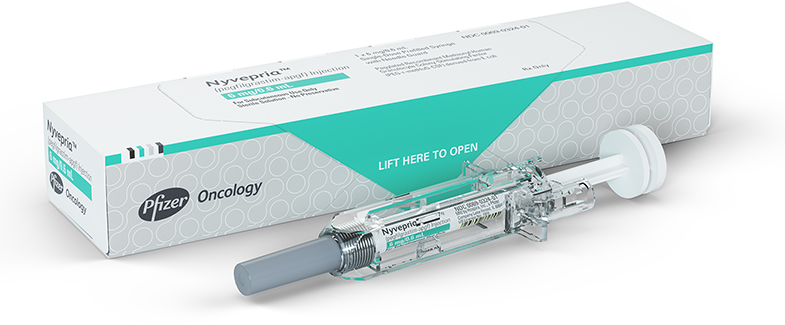
What should I do before receiving NYVEPRIA?
Do not take NYVEPRIA if you have had a serious allergic reaction to pegfilgrastim or filgrastim products.
Before you receive NYVEPRIA, tell your healthcare provider about all of your medical conditions, including if you:
- have a sickle cell disorder
- have kidney problems
- are pregnant or plan to become pregnant. It is not known if NYVEPRIA will harm your unborn baby
- are breastfeeding or plan to breastfeed. It is not known if NYVEPRIA passes into your breast milk
Tell your healthcare provider about all of the medicines you take, including prescription and over-the-counter medicines, vitamins, and herbal supplements.

How will I receive NYVEPRIA?
Your healthcare provider will use a prefilled syringe to administer NYVEPRIA via an injection under the skin (subcutaneous).
If your healthcare provider decides that the subcutaneous injections can be given at home by you or your caregiver, follow the detailed "Instructions for Use" that comes with your NYVEPRIA for information on how to prepare and inject a dose of NYVEPRIA.

You or your caregiver will be shown how to properly prepare and inject NYVEPRIA prior to use.

You should not inject children weighing less than 45 kg with a prefilled syringe containing NYVEPRIA. A dose less than 0.6 mL (6 mg) cannot be accurately measured using the NYVEPRIA prefilled syringe.

If you're receiving NYVEPRIA because you're also receiving chemotherapy, the last dose of NYVEPRIA should be injected at least 14 days before and 24 hours after your dose of chemotherapy.

If you miss a dose of NYVEPRIA, talk to your healthcare provider about when you should take your next dose.

How should I store NYVEPRIA?

Store NYVEPRIA in the refrigerator between 36°F and 46°F (2°C to 8°C).
Do not freeze. If NYVEPRIA is accidentally frozen, allow the prefilled syringe to thaw in the refrigerator before injecting.

Do not use a NYVEPRIA prefilled syringe that has been frozen more than 1 time. Use a new NYVEPRIA prefilled syringe.

Keep the prefilled syringe in the original carton to protect from light or physical damage.

Do not shake the prefilled syringe.

Take NYVEPRIA out of the refrigerator 30 minutes before use and allow it to reach room temperature before preparing an injection.

Throw away (dispose of) any NYVEPRIA that has been left at room temperature, 68°F to 77°F (20°C to 25°C), for more than 15 days.
Keep the NYVEPRIA prefilled syringe out of the reach of children.

For additional information about NYVEPRIA,
please see the Patient Information, including Instructions for Use


